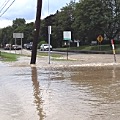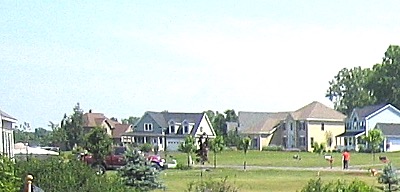- By -
- News
 Print
Print  More than a dozen worried and angry residents of the Autumn Ridge development in the southwest part of the Town of Lansing came to Wednesday's Town Board meeting to find out what the Town has planned to prevent severe flooding that plagued the neighborhood in the past year's extreme weather. Some demanded that the Town fix the problem, but town officials, while wanting to help to some extent, questioned whether it is legal to spend all taxpayers' money to fix a problem on private property.
More than a dozen worried and angry residents of the Autumn Ridge development in the southwest part of the Town of Lansing came to Wednesday's Town Board meeting to find out what the Town has planned to prevent severe flooding that plagued the neighborhood in the past year's extreme weather. Some demanded that the Town fix the problem, but town officials, while wanting to help to some extent, questioned whether it is legal to spend all taxpayers' money to fix a problem on private property."If you had permission to enter property you could enter property," said Town Attorney Guy Krogh. "That's the right of legal access. I haven't discussed the extent to which it's legal to utilize everybody's money to benefit a limited part of the population. With flooding and flood control and flood prevention you do have a lot of authority, but at what point are you leaving something that's a public problem and going to something that's a private problem and using public money on it?"
Krogh said there are two levels to the problem: access and expense. Access has been a serious problem in the divided neighborhood. It comes down to people whose basements are flooded wanting a remedy, and people whose homes remained dry opposing it.
Last August one resident tried to have Highway Superintendent Jack French's and Deputy Superintendent Charlie Purcell arrested for trespassing on his property. Deputy Sheriffs came to the highway officials' homes to arrest them for trespassing on a property in the Autumn Ridge neighborhood. The Sheriffs left without detaining French and Purcell when it was explained to them that the Highway Superintendent and his deputy have the legal authority to go onto private property to inspect problems caused by things like flooding. At that time French said email he received from homeowners revealed a contentious neighborhood, half of whom want flood mitigation, and the other half opposing it.
Part of the problem is that water from a large field drains water into the neighborhood. While some measures were taken when Autumn Ridge was developed, homeowners have not maintained ditches and berms that were designed to deflect flood water. Aggravating the problem is the fact that floodwater laws had not yet been enacted to require more effective flood mitigation. On top of that neighbors don't agree on what, if anything, should be done. One threatened to sue the Town if construction conducted by the town to mitigate flooding there ends up damaging his property.
 Autumn Ridge was developed about 25 years ago, before state and local storm water legislation was in effect
Autumn Ridge was developed about 25 years ago, before state and local storm water legislation was in effectNeighbors said they received conflicting information from the Town, and were angry that the Town wasn't acting faster to fix the problem before the next potential flooding season. Many had several inches of water in their basements, as well as damage to yards.
"What happens when water comes from 65 acres of empty land to which you have never payed attention?" demanded resident Ram Shormo. "How much water three inches of rain or ten inches of snow melt can bring onto our properties? We are not draining our water -- we are draining someone else's water. And we have given permission to go ahead and dig (ditches to capture and manage the water)."
Shormo said the Town had provided him with some sandbags to help protect his property, but he was waiting for more. Deputy Highway Superintendent Charlie 'Cricket' Purcell said that the department had run out of sand bags, but had ordered more, and promised to provide them when they arrive.
Beyond these small solutions Miller said that none of the board members are engineers, and she is inclined to follow Town Engineer David Herrick's recommendations. She added that the legal issues limit the town's ability to act. She noted that the Town had already authorized $7,000 of taxpayer money for the engineering study. She read part of a report that Herrick sent earlier that day after inspecting the neighborhood. Herrick noted he had previously suggested some 'large strategies' to mitigate flooding in the neighborhood, that included ditches and berms on property that landowners whose properties lie above Autumn Ridge had agreed to donate in order to help the neighborhood.
But Herrick's email said he is now recommending 'small strategies' be tried first. He said that ditches could be improved in clearly identifiable locations on private property within the development. He added that if the board chooses he could provide the technical analysis and construction details for each location. Miller summarized that first the 'small solutions' should be tried and if they are not effective 'large solutions' should be implemented. Finally she said a drainage district should be formed.
Councilman Ed LaVigne said that he would rally volunteers to help implement the 'small solutions' and even went so far as to say he would provide sand bags at his own expense.
Krogh said that a good solution would be to create a drainage district. Such a structure works the same way as lighting and water districts in that the people within the district have a charge added to their tax bill that is only used for that specific purpose and those specific property owners. The Town does the work but only those within the district pay.
Deputy Supervisor Sharon Bowman stated the issue most bluntly.
"The Town has authorised the engineer to do the study, but ultimately the dollars that are paying for what happens are not, and should not be at the cost of the rest of the Taxpayers of the Town of Lansing," she said. "It's not the Town's property. We empathize and we sympathies, and we're trying to come up with a resolution, but the neighborhood needs to understand that it's not the Town's responsibility. The Town is reaching out to do the right thing to the extent it can, but it won't have the ability to use the rest of the Town's tax dollars to fix the problem up there."
She added that Lansing has already gone beyond what most municipalities would do in similar circumstances in that the Town payed for the engineer's report and provided sandbags to private property owners.
"We don't have any answers for you right now," Miller said. "But we're working on it. We'll start small and if that doesn't take care of the problem we can always go bigger."
v11i12
